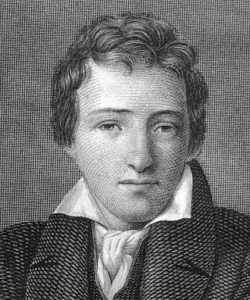Teaching German Resistance during World War II
Teaching German Resistance to 1st and 2nd Year College-Level Students
In English or German, Alexandra Lehmann, M.A./Vordiplom Germanistik teaches “German Resistance During World War II.” She has been invited to lecture in Holocaust and German Cultural Studies classes at several New England colleges and universities including Sarah Lawrence and Mt. Holyoke Colleges, and Fairfield and Western Connecticut State Universities.

Heinrich Heine (1797-1856) German poet and writer most recognized for his “Lieder (art songs)” set to music composed by R. Schumann and F. Schubert. Sophie famously defended his work at a girls’ Hitler Youth meeting. Heine made a very prophetic statement about book burnings in the mid-18th century.
Depending on the context of the class syllabus, Ms. Lehmann uses Fritz Hartnagel and Sophie Scholl’s six year correspondence in several different ways. She focusses on these historical letters to demonstrate censorship and propaganda in a totalitarian state, the nature of passive and active resistance along with the cultural, parental and religious influences on the White Rose students in Munich.
TEACHING GERMAN RESISTANCE
“One of the most rewarding things about staying with a subject this long is to get to see how perspectives change over time. When I started this journey of learning about how Germans lived under Hitler, including interviewing my family of origin, most people unfamiliar with this story believed absolutely that all Germans were Nazis. While I do not speculate otherwise, I do know that my subjects, Sophie Scholl and Fritz Hartnagel, did not adhere or practice Nazi ideology during the war.
I’ve had unpleasant questions thrown at me in graduate school about my grandparents (2003); and I’ve had a guest lecture interrupted by a tenured Professor insisting that Fritz Hartnagel was a Nazi (2016). While I was taken aback during both incidents and personally affronted, I am grateful to be so rooted in this history that my opinion will never change about Sophie and Fritz.
I challenge anyone who believes Fritz is an accomplice to SS atrocities and/or is complicit, to read his hundreds of letters to sent to Sophie during the war. There is nothing like studying primary sources in their original language.” – Alexandra Lehmann
